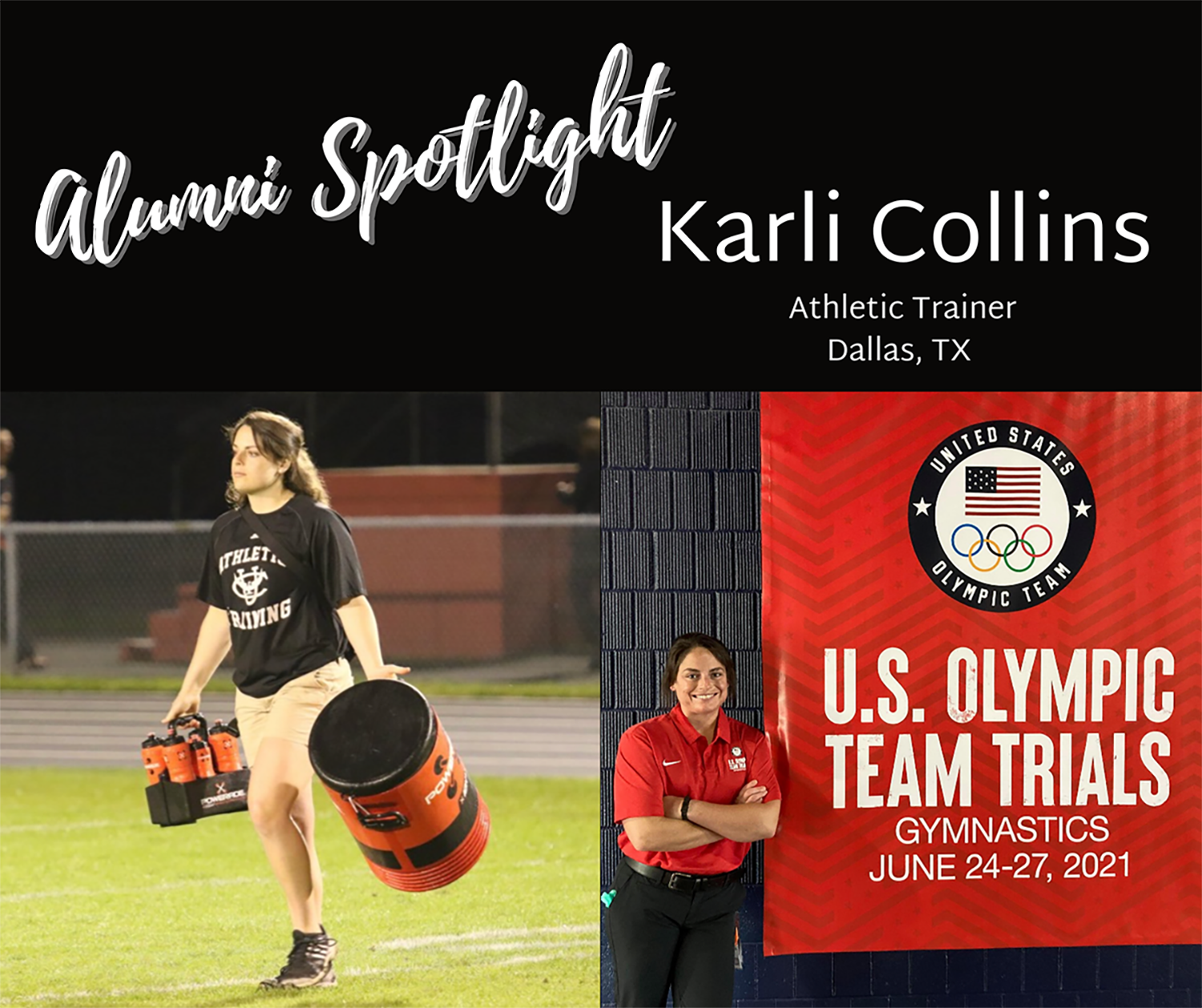Karli Collins attended Cumberland from 2011 until 2016. She received her Bachelor of Science in Athletic Training, Bachelor of Science in Health & Human Performance, and Master’s of Science in Health & Human Performance. She now works as an Athletic Trainer in physician practice at Texas Health Sports Medicine. Previously, she worked at the University of Rhode Island and the University of Louisiana. Originally from Clearwater, Florida, Collins lives in Dallas, Texas. In June, Collins worked the Olympic Trials and USA Gym National Championships. She is also a member of the CU Alumni Association Board of Directors.
What were you involved in at CU?
President of Student Government Association, Fellowship of Christian Athletes, Athletic Training Student Association, Leadership Academy, ODK.
Why did you choose Cumberland?
I chose Cumberland because it is one of the rare institutions that allows one to attempt to be both a student and an athlete in the athletic training program. Most universities do not allow one to even attempt to play collegiate sports if they are pursuing an education in athletic training (due to the high volume of clinical hours and studying that is required).
Are there any professors or classmates who impacted your journey?
James Meadows & LaKeisha Fair, professors for Athletic Training. Dr. Storie and Dr. Grindstaff, professors for Health & Human Performance. Brittney Roberts, Layci Watts, Leslie Payne, Ian Hamilton, Katie Legge, AC Agee, Michelle Evans, CU Volleyball, CU Leadership Academy and Cumberland Wrestling were classmates, friends or groups who significantly impacted my journey at CU.
What courses were particularly meaningful for you?
Leadership Academy & our preparation for Haiti, Sport Psychology with Dr. Grindstaff, Rehabilitation Methods with James Meadows
What do you know now that you wish you had known when you were a student?
Grades, GPAs and test scores are important. Homework is important. But, clinically understanding the “whole” of the material is the most vital part of your education.
Share about your Olympic Trials experience. What was it like? What did you do?
I work with the Trampoline & Tumbling discipline for USA Gym, and they had their USA Nationals competition the same week & location as the USA Olympic Trials. The nationals competition was 1 week long, with the trials being 4 days. I arrived a couple days before to help unpack medical supplies, set up treatment areas, medical tents, etc. for our upcoming events.
The main competition hall was in the dome, which was separated in half with the U.S. Trials bubble side and the Nationals side. The other part of the convention center housed training, warm-up and competition areas for the T&T, Rhythmic and Acro disciplines. We helped care for a range of athletes across varying skill levels and disciplines during the USA Nationals competition, as well as assisting when needed with the Olympic Trials. Daily tasks ranged from making ice bags & taping athletes to performing evaluations and treatments as well as managing acute injuries during training and competition.
Her Story:
Sharing a story in one setting in a small box does not encompass the life that I experienced at CU. The successes, lessons learned, knowledge gained and friends that became family are all something that I will struggle to place into a short summary. I played volleyball for CU and double majored in Athletic Training and Health & Human Performance. During my undergraduate athletic training education, I worked with all CU sports as well as many off campus rotations in which I met classmates and preceptors that I still keep in contact with to this day. As an athlete, I encountered many people who helped me grow as a human on and off the court.
I went on to complete my master’s degree at CU, while working as the graduate assistant athletic trainer for wrestling and golf. I was involved in multiple organizations, clubs and hobbies outside of school and volleyball, to which one of those was being in the Leadership Academy as well as being the president of CU’s Student Government Association.
Upon graduation, I was given the honor of speaking at the ceremony. I remember sharing a story that I encountered during our Leadership Academy trip to Haiti where we spent an entire day climbing a mountain. Halfway through our day-long trek, Dr. Natalie Inman kindly refused the offer from one of the Haitians in using their donkey to get to the top. She advised them that she would rather walk, “because it is all about the journey and not necessarily the destination.” Looking back on my time at CU until now, with all of the life events that have happened in between, these words have stuck with me.
Cumberland was a big part of my journey in getting me to multiple destinations, and it is still a huge part of who I am today. The people and community at Cumberland helped me to get to where I am today, and will definitely continue to help me move forward along the journey! I am very grateful that God gave me the abilities and talents that I have, and that I experienced the community of Cumberland.
How did your experiences at CU help with your professional pursuits?
My experiences at Cumberland helped with my pursuits both professionally and personally by helping to give me a solid foundation to stand on. That foundation was built through my education, clinicals, classes and ‘life’ experiences at Cumberland. By having that experience, I was able to continue to build upon my career and the profession that I highly value.


